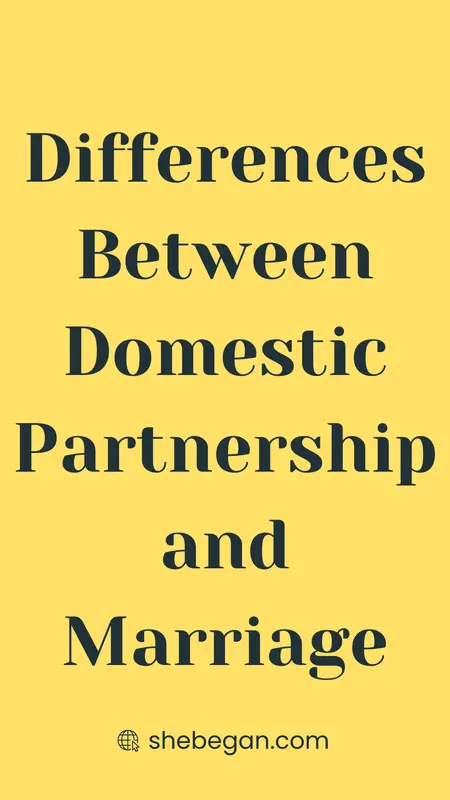When we talk about relationships, two terms often come up: domestic partnership and marriage. They might seem similar, but they are quite different in many ways. How are they similar, and how are they different?
The main difference between these two is that it’s mostly about how the law sees these relationships. Marriages are recognized everywhere – in every state in the U.S. and in most other countries too. But domestic partnerships? They aren’t recognized in many states.
This difference can affect a lot of things in a couple’s life, from big stuff like legal rights to everyday things like health benefits. So, understanding these differences can really matter to a lot of people. Let’s take a closer look at each of these and see what makes them unique.

What is a Domestic Partnership?
A domestic partnership is like a formal agreement between two people who live together and share a domestic life but aren’t legally married.
The concept of domestic partnerships started gaining traction in the late 20th century. It was initially a way to recognize the relationships of same-sex couples, especially when they couldn’t legally marry. Over time, it has evolved to include opposite-sex couples, too, often for those who prefer not to marry for personal reasons.
The legal and social framework of domestic partnerships can be a bit different, it varies a lot depending on where you live. In some places, domestic partners get similar rights to married couples, like health insurance benefits and hospital visitation rights. But in other places, these rights might not be as comprehensive.
Typically, domestic partnerships include couples who live together, share a domestic life, and are not married to anyone else. This can include same-sex couples, elderly couples who choose not to marry due to financial reasons like pension benefits, or any couple who feels that marriage isn’t the right fit for them.
What is Marriage?
Now, let’s talk about marriage. It’s like the classic, well-known recipe in the cookbook of relationships. Marriage is a legally and socially recognized union between two people. It’s a commitment that’s celebrated and acknowledged not just by the couple but by their families, friends, and the law.
Historically, marriage has been around for centuries. It’s like an old tree in the garden of human society, with roots deep in history, tradition, and culture. In the past, marriages were often about alliances, property, or continuing family lines. Over time, the idea of marrying for love has grown, making marriage a personal and emotional commitment as much as a legal one.
The legal and cultural importance of marriage is huge. It offers the most rights and protections in healthcare, from tax benefits to inheritance and decision-making powers. Culturally, marriage is often seen as a major life goal, a celebration of love and commitment. It’s a key part of many people’s stories.

Benefits of Domestic Partnership
1. Legal benefits
If you’re in a domestic partnership, in many cases, you can visit your partner and make important health decisions for them, just like a spouse would. It’s about being there for each other in tough times. At the same time, if something unexpected happens, like an accident, being in a domestic partnership can give you the right to make decisions about emergency care and other urgent matters.
2. Social benefits
Even though it’s not marriage, a domestic partnership still tells the world, “We’re together, we’re committed.” It’s like having a social stamp of approval, especially important in circles where this commitment is valued. In some communities and groups, being in a recognized relationship, even if it’s not marriage, can matter a lot. It makes you feel accepted and included.
3. Financial benefits
Now, this can be tricky. Some places might offer tax benefits similar to marriage, but it’s not always the case. Many employers extend insurance benefits to domestic partners, just like they do for spouses. This can be a big help with bills and health care.
Benefits of Marriage
Marriage comes with a pretty packed benefits package.
1. Extensive legal benefits
Married couples often get to enjoy perks like filing joint tax returns, which can lead to savings. Also, when married, if one partner passes away, the other usually gets the estate without a hitch. It’s a security blanket, ensuring that your partner is taken care of after you’re gone.
This also includes things like making medical decisions for each other in emergencies and enjoying spousal testimonial privileges in court. Basically, marriage strengthens your legal toolkit.
2. Social and cultural advantages
Marriage is like the golden standard in relationships. It’s recognized and celebrated almost everywhere, giving couples a sense of belonging and acceptance in society. In many cultures, marriage is a key milestone. It’s not just a legal bond; it’s a rite of passage that is rooted in tradition and cultural significance.
3. Financial and economic benefits
Married couples often have the ease of owning property jointly. It simplifies things like buying a home or managing assets. Another perk is that spouses are usually entitled to pension benefits, which can be crucial for long-term financial security.
4. International recognition and status
This is where marriage really stands out. If you’re married, that status is recognized almost globally. It means if you travel or move abroad, your marital status travels with you. It’s like a relationship passport that’s valid in almost every country.
Marriage vs. Domestic Partnerships
1. Marriage is more recognized legally
Marriage unlocks legal recognition everywhere in the U.S. and most parts of the world. Think of it as a relationship status that’s universally acknowledged. Domestic partnerships, on the other hand, only work in certain places. They’re not recognized in all states or countries, which can be a bit of a hurdle for couples in these relationships.
2. Domestic partners are not recognized as family
Domestic partners aren’t seen as ‘family’ in the eyes of the law. This can affect everything from hospital visitation rights to making emergency decisions. However, the silver lining is that some employers step up to bridge this gap, offering benefits similar to those for spouses.
3. Domestic partnerships are not federally recognized
Federal recognition is a seal of approval that opens up a lot of doors, and domestic partnerships often don’t have this seal. It’s especially noticeable in areas like immigration. For example, if you’re married, you can petition for your non-citizen spouse. But in a domestic partnership? That path isn’t available. It’s a significant difference that can impact life-altering decisions.
4. Inheritance and taxes favor marriage more
Money matters, and here marriage has an edge. Married couples have the advantage of inheriting each other’s assets without facing taxes. It’s a financial safety net built into the marriage. Domestic partners don’t have this built-in benefit. They can certainly leave assets to each other through a will, but the taxman might take a bigger slice of that pie.

Conclusion
Both domestic partnerships and marriage are forms of relationships, each with its unique flavor and texture. They both lead to the same destination of commitment and companionship. However, it’s important to recognize that these paths are distinct from each other, each marked by its set of benefits, limitations, and societal recognitions.






